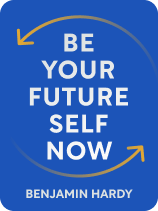

This article is an excerpt from the Shortform book guide to "Be Your Future Self Now" by Benjamin Hardy. Shortform has the world's best summaries and analyses of books you should be reading.
Like this article? Sign up for a free trial here.
How do the people in our lives influence us? Are your friends or colleagues instrumental in your self-improvement journey?
In Be Your Future Self Now, Benjamin Hardy recommends putting yourself in environments that will help you become your higher self. This is because you are a product of your environment—the situations you put yourself in and the people you surround yourself with impact who you are and what you achieve.
Find out what you can do to push yourself beyond your limits by using the world around you.
Seek Out Beneficial Environments
Because you are a product of your environment, Hardy says you should step out of your comfort zone and associate with people who are better than you are so you learn to overcome challenges and acquire the skills and habits necessary to progress toward becoming your higher self. The following sections will explain why these two recommendations are important and how to follow them.
(Shortform note: In The Compound Effect, Darren Hardy reiterates that we’re products of our environments—the people and situations we surround ourselves with shape how we think, feel, and act. He adds that the content we consume also has a major impact on us, including the news we watch, books and magazines we read, music we listen to, and so on. So in addition to spending time with people who are better than you and pushing yourself outside your comfort zone, ensure that you’re consuming content that’s educational and inspirational rather than negative and unenlightening. For example, watch BBC News rather than E! News.)
Principle #1: Step Out of Your Comfort Zone
Hardy recommends stepping out of your comfort zone by doing things that your higher self would succeed at but your present self might not. This is crucial because, although you might fail, people make the most progress by learning from their failures. Failure forces you to confront your insufficiencies and identify how you can become stronger in those areas.
For example, imagine that your higher self is a professional graphic designer who designs images for major companies; however, your present self is regularly designing logos only for small, local businesses. Continuing to design logos for these small businesses won’t help you become your higher self because you’re simply practicing something you’re already good at—designing the types of logos that small, local businesses like. But applying to design graphics for larger businesses, even though you’re likely to be turned down at first, will teach you what they’re looking for and what you need to improve on.
(Shortform note: Experts agree that stepping outside your comfort zone is crucial for personal growth and success; however, it’s difficult to reap the benefits if you’re too intimidated. A few steps can make the process less daunting and more useful. For example, rather than comparing yourself to others, which can make you feel vulnerable, focus on your personal growth. Also, remind yourself that other people are outside of their comfort zone as well—you’re not the only one exposing your weaknesses.)
Principle #2: Surround Yourself With People Who Are Better Than You
To surround yourself with people who are better than you, as Hardy recommends, look for people like your higher self; they’ll have achieved goals similar to yours, or at least be closer to achieving them than you are. Their habits and behaviors will compel you to emulate them and be more like your higher self. Further, they can give you advice and strategies to overcome obstacles you might face because they’ve already overcome similar obstacles.
(Shortform note: In The Compound Effect, Darren Hardy argues that the first step in surrounding yourself with better people is to sort your current associations into three categories. The first is dissociations—people who exhibit the behaviors you’re actively avoiding. Cut ties with them immediately. The next category is limited associations—people who possess some negative traits, but won’t immediately impact your behavior. It’s OK to spend some time with them, but limit your contact. The final category is expanded associations—people whom you aspire to emulate. Go out of your way to spend more time with them.)

———End of Preview———
Like what you just read? Read the rest of the world's best book summary and analysis of Benjamin Hardy's "Be Your Future Self Now" at Shortform.
Here's what you'll find in our full Be Your Future Self Now summary:
- Why everyone must try to live up to their full potential
- How to identify your potential and the goals that will help you reach it
- Recommendations on how to become your highest self






